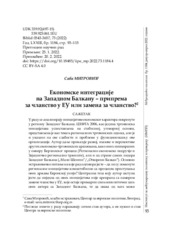Приказ основних података о документу
Економске интеграције на Западном Балкану — припрема за чланство у ЕУ или замена за чланство?
Economic integration in the western Balkans – preparation for EU membership or replacement for membership?
| dc.creator | Mitrović, Sava | |
| dc.date.accessioned | 2024-03-19T14:10:49Z | |
| dc.date.available | 2024-03-19T14:10:49Z | |
| dc.date.issued | 2022 | |
| dc.identifier.issn | 0543-3657 | |
| dc.identifier.uri | http://rfpn.fpn.bg.ac.rs/handle/123456789/1223 | |
| dc.description.abstract | У раду се анализирају иницијативе економског карактера покренуте у региону Западног Балкана. ЦЕФТА 2006, као једина трговинска иницијатава успостављена на стабилној, уговорној основи, представљена је као темељ регионалних трговинских односа, али је и указано на све слабости и проблеме у функционисању ове организације. Аутор даље приказује развој, изазове и перспективе других економско-трговинских аранжмана, како оних иницираних у оквиру Берлинског процеса (Регионално економско подручје и Заједничко регионално тржиште), али и од стране самих лидера Западног Балкана („Мали Шенген” „Отворени Балкан”). Основно истраживачко питање на које рад одговора јесте – да ли су поменуте регионалне иницијативе компатибилне са процесом приступања ових држава Европској унији? Централна теза коју аутор заступа јесте да ниједна од ових иницијатива није креирана са намером замене чланства у ЕУ, које остаје примарни спољнополитички циљ свих актера са Западног Балкана, те да свака од њих може представљати добру припрему региона за изазове учешћа на унутрашњем тржишту ЕУ, али и бити подстицај за спровођење неких од кључних реформи у оквиру приступног процеса. | sr |
| dc.description.abstract | This paper aims to analyse economic initiatives launched in the Western Balkans. The CEFTA 2006 Agreement, as the only trade initiative established on a stable and contractual basis, represents the core of regional trade relations. On the other hand, the CEFTA has numerous flaws and operational problems, which will be examined further. The author further reviews the development, challenges, and perspectives of other economic and trade arrangements, like those initiated within the Berlin Process (the Regional Economic Area and Common Regional Market), as well as by the Western Balkans leaders themselves (“Mini Schengen”/“Open Balkan”). The main research question addressed in this paper is whether the aforementioned regional initiatives are compatible with the EU accession processes of these countries. The author’s central thesis is that none of these initiatives were created to replace EU membership. Membership remains the primary foreign policy goal of all Western Balkan actors, and each of them could help the region prepare for the challenges of participating in the EU internal market. Moreover, they could be seen as an incentive to implement key reforms as part of the EU accession process. | sr |
| dc.language.iso | sr | sr |
| dc.publisher | Београд : Институт за међународну политику и привреду | sr |
| dc.rights | openAccess | sr |
| dc.rights.uri | https://creativecommons.org/licenses/by-nc-nd/4.0/ | |
| dc.source | Међународна политика | sr |
| dc.subject | Western Balkans | sr |
| dc.subject | European Union | sr |
| dc.subject | CEFTA | sr |
| dc.subject | Berlin Process | sr |
| dc.subject | Regional Economic Area | sr |
| dc.subject | Common Regional Market | sr |
| dc.subject | Mini Schengen | sr |
| dc.subject | Open Balkan | sr |
| dc.subject | regional initiatives | sr |
| dc.subject | accession process | sr |
| dc.subject | membership | sr |
| dc.title | Економске интеграције на Западном Балкану — припрема за чланство у ЕУ или замена за чланство? | sr |
| dc.title | Economic integration in the western Balkans – preparation for EU membership or replacement for membership? | sr |
| dc.type | article | sr |
| dc.rights.license | BY-NC-ND | sr |
| dc.citation.epage | 115 | |
| dc.citation.issue | 1184 | |
| dc.citation.rank | M51 | |
| dc.citation.spage | 93 | |
| dc.citation.volume | LXXIII | |
| dc.identifier.doi | 10.18485/iipe_mp.2022.73.1184.4 | |
| dc.identifier.fulltext | http://rfpn.fpn.bg.ac.rs/bitstream/id/3564/fulltext.pdf | |
| dc.type.version | publishedVersion | sr |

